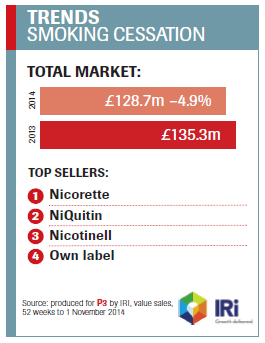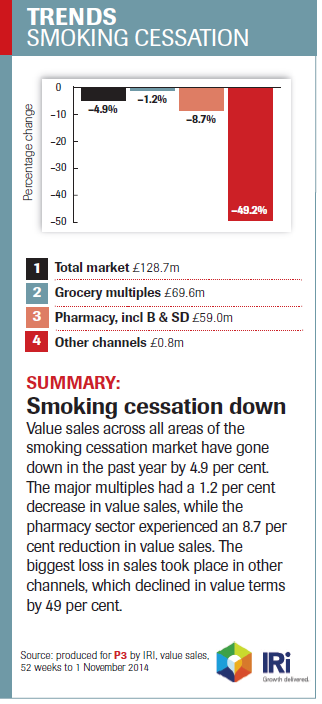Insight

Stubbing out the habit
In Insight
Bookmark
Record learning outcomes
The smoking cessation market is changing and the market for e-cigarettes is booming. With so many options now available in and out of the pharmacy, offering the right advice, help and support will be key
Sales of smoking cessation aids, such as nicotine replacement therapy (NRT), have slowed, according to recent data from analysts IRI. In 2014, the smoking cessation market declined by nearly 5 per cent to a value just under £129 million (see graph on right). The UK market for e-cigarettes, on the other hand, is booming, with an estimated value expected to be around £340 million in the UK during 2015, according to Public Health England.
Health and Social Care Information Centre (HSCIC) statistics published in 2013 revealed that 21 per cent of people who set a quit date with NHS smoking services did so through a pharmacy, and 48 per cent of those using these pharmacy services were successful. But with the rising popularity of e-cigarettes, community pharmacists may have to work harder than ever to get people through their doors for smoking cessation advice.
‘Pharmacies need to become the go-to place for smoking cessation advice and products,’ says Graham Phillips, superintendent pharmacist of Manor Pharmacy Group. ‘They should be proactive in promoting their services, with window displays, marketing through local GP practices and leaflet drops. Every contact counts – so every time someone comes in for cough medicine, for example, ask if they smoke and, if so, whether they would like to quit.’
Mr Philips adds: ‘Becoming a Healthy Living Pharmacy, so that all staff can be trained in public health issues, is an important investment. Pharmacies also need to add value to NRT products with a combination of smoking cessation and harm reduction advice. If customers enjoy smoking, telling them not to smoke at all isn’t the answer – replacing some of their daily cigarettes with NRT, or even e-cigarettes, may be what works for them.’
Smoking cessation advice
Heightened public awareness around national campaigns gives pharmacists an opportunity to demonstrate their commitment to customers’ health, says Mimi Lau, Numark’s director of pharmacy services. For example, the British Heart Foundation (BHF) is encouraging pharmacy staff to use No Smoking Day on 11 March 2015 as an opportunity to promote pharmacy smoking cessation services.
Pharmacists play an integral role in preparing and supporting smokers during their quit journey as Dr Mike
 Knapton, associate medical director at the BHF, explains: ‘From educating smokers on the benefits of quitting, to advising on the right aids and resources for a successful quit attempt, pharmacists and pharmacy staff are able to make a real difference to the health of their local communities.
‘Supporting the No Smoking Day campaign can be as easy as decorating reception areas and handing out leaflets. Engaging patients on the subject might help them take the first step towards a smoke-free life.’
Weight gain concerns
New research from Nicotinell shows that 56 per cent of smokers are concerned about weight gain when quitting – this can mean that many people hesitate to reduce or quit smoking in the long term. Guidance on healthy eating and physical activity should be part of every smoking cessation programme. ‘Services should motivate the patient and give them a chance to discuss their concerns,’ says Ms Lau. ‘Building a relationship through a support programme will create loyalty with the pharmacy. It is a good idea to offer other services, too, such as blood pressure monitoring, cholesterol and diabetes screening, which underline the image of the pharmacist as a healthcare professional.’
NRT choices
It’s important that pharmacists offer a wide range of NRT products and formats to suit customers’ different needs, explains Shauna Lenagh, marketing manager at NiQuitin. ‘GlaxoSmithKline would recommend displaying the various brands and products in order of format, for example gums and lozenges together, in a visible location,’ she says. ‘To convert sales and encourage purchase, it’s vital to engage shoppers beyond the shelf. For this reason, GSK recommends that pharmacists display NiQuitin Strips on the counter or in areas where impulse purchases are made. This will help to target smokers who are using NRT for on-the-go craving relief and further communicate the impulse nature of this product.’
Rise of e-cigarettes
There are an estimated 1.3 million e-cigarette users in the UK, according to Christian Mulcahy of multiCIG. Many major pharmacy retailers are now stocking the devices, including Boots, Tesco and LloydsPharmacy. Some independents are also selling e-cigarettes, but there is still considerable debate over whether pharmacies should be doing so.

E-cigarettes are largely marketed as an alternative to smoking, but many smokers have been using them to cut down or quit. Nigel Hardy, Nicoventures head of UK and Europe, says that pharmacists need to recognise that NRT and e-cigarettes play a different role. ‘NRT products are explicitly to aid smoking cessation and are licensed as such,’ he says. ‘E-cigarettes offer an alternative solution for the smoker who wants to continue to use nicotine. The two product offerings should be clearly distinguished in any retail environment.’
The MHRA is expected to license e-cigarettes as medicines in the UK from 2016. Ms Lau says that although e-cigarettes are not yet licensed products, their popularity and growing presence in the market cannot be ignored. ‘Of course e-cigarettes shouldn’t be included in a NRT programme, but pharmacies are in a position to monitor sales of the products to their consumers and, where necessary, provide appropriate advice around stopping smoking completely,’ she says. ‘Traditional cigarettes are a killer, so any alternative that is likely to be safer has to be a preferred option.’
Sean Woodward, an independent community pharmacist in Stoke-on-Trent, says that while he recommends e-cigarettes to customers who are struggling to quit, he isn’t ready to stock them in his pharmacy due to the lack of licensing. ‘I believe that e-cigarettes are the next step for pharmacists,’ he says. ‘Reducing from 30 cigarettes a day to four or five is better than not stopping at all. But the products need to be regulated before I can recommend any particular e-cigarette products.’
Mr Phillips, however, says that he is stocking e-cigarette brands that probably will be licensed once the legislation is in place. ‘We have taken on a limited range but enough to offer customers some choice, making it easier for them to buy a product that they like and can stick with,’ he says. ‘We are making e-cigarettes very accessible within the pharmacy – not self-selection, but on the front counter in cabinets. And we treat them as an alternative to NRT when advising customers – it’s just a different format, in the same way that a customer may choose to use an NRT inhalator rather than a patch.’
Comment
 Shaheen Bhatia, P&S Chemist Health and Advice Centre, Ilford ‘We can’t get away from the fact that people are interested in e-cigarettes and I think we need to do some more work to see how we can incorporate them into helping people to give up smoking. The main concern is whether the products are safe or not. If we can standardise them so they can be used to help people give up smoking cigarettes that can only be a positive thing. Until we get an MHRA-approved device, choosing a company that you know and recognise for being more ethically minded could be the answer. Customers will go somewhere else to get them regardless of whether we stock them so it might be better for them to come to a pharmacy where they can get advice about all of the options available.’
Shaheen Bhatia, P&S Chemist Health and Advice Centre, Ilford ‘We can’t get away from the fact that people are interested in e-cigarettes and I think we need to do some more work to see how we can incorporate them into helping people to give up smoking. The main concern is whether the products are safe or not. If we can standardise them so they can be used to help people give up smoking cigarettes that can only be a positive thing. Until we get an MHRA-approved device, choosing a company that you know and recognise for being more ethically minded could be the answer. Customers will go somewhere else to get them regardless of whether we stock them so it might be better for them to come to a pharmacy where they can get advice about all of the options available.’
 Bipin Patel, Broadway Pharmacy, Bexleyheath ‘We offer a no smoking service and whenever there is a national campaign surrounding smoking, we find that interest goes up. We give realistic goals and make sure customers know what to expect and how long it will take. We don’t do e-cigarettes in my pharmacy, but once the products are recognised and accepted, we’ll certainly consider stocking them. I might stock them sooner rather than later because I’ve seen that one smoking cessation organisation has some new guidance to support people who want to use e-cigarettes to quit. There is a whole range of products and brands to choose from so I will be looking at what the trade magazines suggest and I will be talking to pharmacists who stock them.’
Bipin Patel, Broadway Pharmacy, Bexleyheath ‘We offer a no smoking service and whenever there is a national campaign surrounding smoking, we find that interest goes up. We give realistic goals and make sure customers know what to expect and how long it will take. We don’t do e-cigarettes in my pharmacy, but once the products are recognised and accepted, we’ll certainly consider stocking them. I might stock them sooner rather than later because I’ve seen that one smoking cessation organisation has some new guidance to support people who want to use e-cigarettes to quit. There is a whole range of products and brands to choose from so I will be looking at what the trade magazines suggest and I will be talking to pharmacists who stock them.’
 Reena Barai, SG Barai Pharmacy, Sutton ‘We don’t stock e-cigarettes but I’m looking forward to their regulation because if they are safe products, I’m a firm believer in harm reduction. If that’s in the form of an e-cigarette, it’s better than being on real cigarettes. If a customer asks for advice about e-cigarettes, I explain that they’re not regulated so we don’t know whether they are safe to use or not. We run a stop smoking service, so whenever we have a request about smoking, we’ll usually sign them up as it doubles their chances of giving up successfully, if they see us on a regular basis. We’ve found that e-cigarettes have changed the steps that some people take towards quitting and are now seeing those who haven’t got on with e-cigarettes and want our help to quit completely.’
Reena Barai, SG Barai Pharmacy, Sutton ‘We don’t stock e-cigarettes but I’m looking forward to their regulation because if they are safe products, I’m a firm believer in harm reduction. If that’s in the form of an e-cigarette, it’s better than being on real cigarettes. If a customer asks for advice about e-cigarettes, I explain that they’re not regulated so we don’t know whether they are safe to use or not. We run a stop smoking service, so whenever we have a request about smoking, we’ll usually sign them up as it doubles their chances of giving up successfully, if they see us on a regular basis. We’ve found that e-cigarettes have changed the steps that some people take towards quitting and are now seeing those who haven’t got on with e-cigarettes and want our help to quit completely.’
